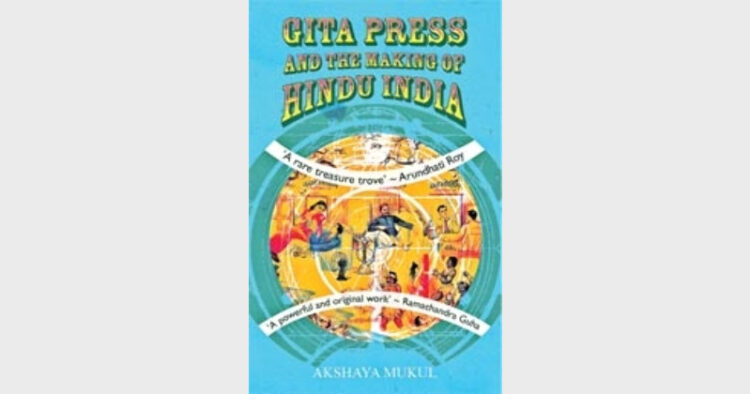Gita Press and the Making of Hindu India is well researched on facts, but intellectually dishonest and haywire on conclusions, the author however does a good job of sufficing his central quest of placing Gita Press within the larger canvas of the much ‘haunted’ Hindu Nationalism in the colonial as well as post-colonial Bharat.
The recently published research work of Akshaya Mukul, a veteran Times of India Journalist, titled Gita Press and the Making of Hindu India would pass the test of intellectual rigor with its 1251 references scattered across 293 sources. This 430 pager work, undertaken over a year sponsored by New India Foundation funded by Nandan Nilekani, managed by Ram Chandra Guha and inspired by Wendy Doniger – the doyenne of Hindu Studies expert in demonising the same, by author's own admission is “not to sing paeans of Gita Press”.
Pursuing the very spirit of her mentor's footsteps who grew to infamy by authoring a crude, lewd and very rude commentary on Hindus, which had to be pulped down by its publisher; this work fares no better. Well researched on facts, but intellectually dishonest and haywire on conclusions, the author however does a good job of sufficing his central quest of placing Gita Press within the larger canvas of the much ‘haunted’ Hindu Nationalism in the colonial as well as post-colonial Bharat.
The epithets of “A rare treasure trove” by the likes of Arundhati Roys and “A powerful and original work” by Ramchandra Guha, somewhere alerts about the mischievous intent of this colossal work. The author couldn't resist his innate affection and reverence to his parents Manorama and Madhusudan, by dedicating this work to them. By his own admittance, he differed on the ideological plane with his father who originally seeded the idea for a book on Gita Press, unravelling its success mantra.
What's noteworthy about this work is the sheer exposition of a global inter-connected network of scholars and academics treading a particular line of thought which is averse to the ideal and reality of Bharat. It's interesting to note that Malavika Kasturi and Kajri Jain of University of Toronto have much say and influence in the affairs concerning Gita Press. The deeper academic interest of Shahid Amin and Ulrike Stark in Gita Press is quite illumining.
Siddharth Varadarajan provides access to The Hindu Archives and a Mushirul Hasan gives a cue on the politics around cow to the author. The novelist and writer Ajaz Ashraf patronises and prods the author and Jyotirmaya Sharma of University of Hyderabad fine-tuning the key arguments. A Nandini Sundar adds on to the narrative around Hindu Nationalist Fascination around adivasis.
This gets all the more intriguing as by author's very own factual admission Gita Press parallels its success with the Bible Society. However, the titles of the chapters suggest it all. From starting with the title of “A Twentieth-Century Hindu Missionary and His Mentor”, the author unravels “The World of Gita Press”, enumerating its Local, National, and Transnational Contributors.
The contextual universe of these Well Oiled Research Networks is somewhere limited to the twin tactics of baiting and denigrating a tolerant and all absorbing and assimilating Bharateeya Civilisation. What better than entrapping and attacking some of its foundational and prominent institutions masquerading geo-political agenda as academic research! These academic Sleeper cells create the baseline breeding ground for the unleashing of intellectual terrorism, of whose power and potential we have witnessed on the domestic political turf.
While, the Dalmatian Bella of Mr Mukul would have been continuing his loyalty to his master, he couldn't resist his temptation to elude the New India Foundation fellowship, to unleash an intellectual treachery with his own parents and motherland. Such is the nature and character of modern day progressive liberality which just perpetrates self-indulgent hollow intellectualism to further deepen the societal fault-lines.
Raghav Mittal (The writer is M.Tech from IIT Kharagpur)














Comments